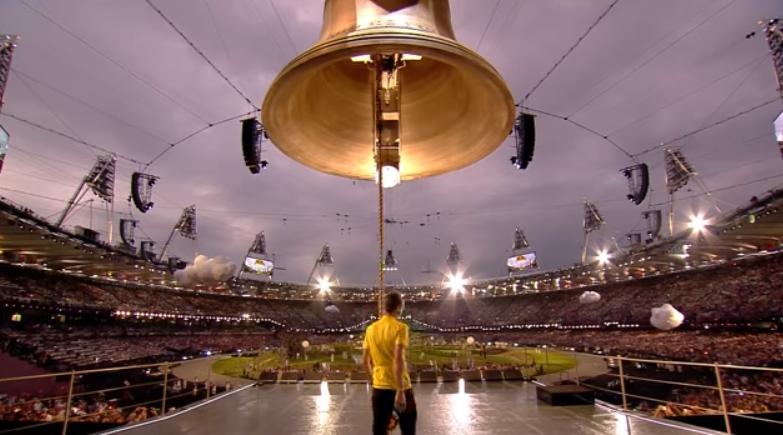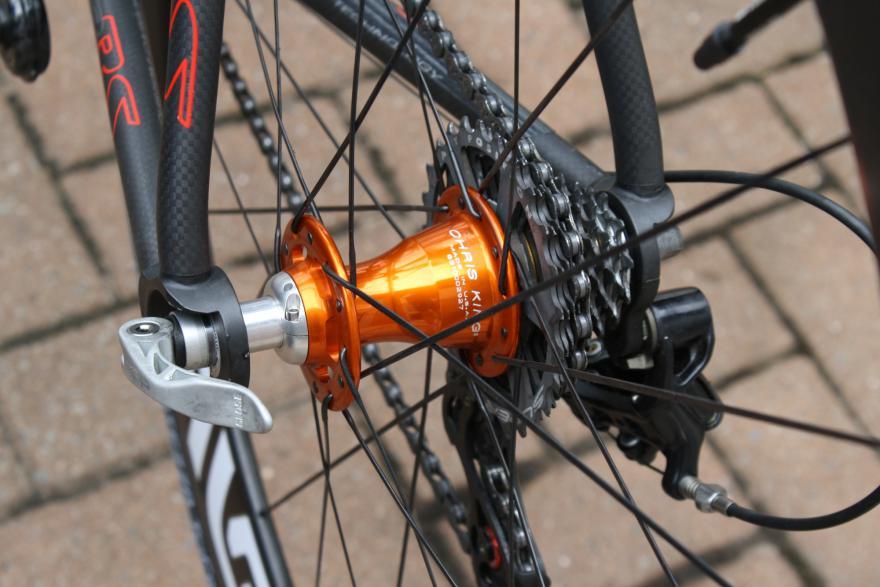- News
- Reviews
- Bikes
- Components
- Bar tape & grips
- Bottom brackets
- Brake & gear cables
- Brake & STI levers
- Brake pads & spares
- Brakes
- Cassettes & freewheels
- Chains
- Chainsets & chainrings
- Derailleurs - front
- Derailleurs - rear
- Forks
- Gear levers & shifters
- Groupsets
- Handlebars & extensions
- Headsets
- Hubs
- Inner tubes
- Pedals
- Quick releases & skewers
- Saddles
- Seatposts
- Stems
- Wheels
- Tyres
- Tubeless valves
- Accessories
- Accessories - misc
- Computer mounts
- Bags
- Bar ends
- Bike bags & cases
- Bottle cages
- Bottles
- Cameras
- Car racks
- Child seats
- Computers
- Glasses
- GPS units
- Helmets
- Lights - front
- Lights - rear
- Lights - sets
- Locks
- Mirrors
- Mudguards
- Racks
- Pumps & CO2 inflators
- Puncture kits
- Reflectives
- Smart watches
- Stands and racks
- Trailers
- Clothing
- Health, fitness and nutrition
- Tools and workshop
- Miscellaneous
- Buyers Guides
- Features
- Forum
- Recommends
- Podcast
news
Live blog: Wiggo gets a bell (no, not the ding-dong kind) from snooker ace ‘Aussie’ Ronnie O’Sullivan, Carbon fibre disc rotors, anyone?, Ouchee – grazed arse cheek for Giro (ex) leader Roglic + more
SUMMARY
 Wiggins and bell (London 2012).PNG
Wiggins and bell (London 2012).PNG16 May 2019, 19:31
Wiggo gets a bell from 'Aussie' Ronnie O'Sullivan
It seems as though our live blog isn't complete these days without a daily dose of Wiggo, but today's offering is a bit out there ... snooker star Ronnie O'Sullivan ringing in with a question for the Tour de France winner and five-time Olympic champion.
And why, you ask, does O'Sullivan, who grew up in Chigwell, Essex, speak thus? Well, here's how he explained it earlier this year: "I just feel totally positive, the Aussies are just winners, you’ve got to love a winner,’ explained O’Sullivan. ‘Our English, we love a loser, so I thought I’m fed up of being a loser, so I’m going to talk like a winner, like the Aussies."
We got 'Aussie' @ronnieo147 to ask @SirWiggo a question
It's worth a listen
Subscribe and listen to The Bradley Wiggins Show
iTunes: https://t.co/bVs2BX4Tza
Spotify: https://t.co/UyWMaCWQ4q pic.twitter.com/ZT5Mn4e2uq— Eurosport UK (@Eurosport_UK) May 14, 2019
16 May 2019, 14:25
16 May 2019, 14:25
Australia's MAMIL trend sees middle-aged cyclists soar as percentage of injured riders admitted to hospital
From 7 per cent in 1999-2000, cyclists aged 45-64 now make up 27 per cent of injured riders admitted to hospital. Read more here.
16 May 2019, 14:15
16 May 2019, 13:58

On your bike! Cycling expenses MP hits back at critical media coverage
Matt Western has also urged other MPs to get in the saddle to show leadership on tackling climate change - read what he had to say here.
16 May 2019, 12:37
Carbon disc rotors anybody?
If lightweight inner tubes weren't enough for you, then how about some carbon fibre disc rotors? We're sure we've seen carbon rotors before, but these are brand new and weigh just 68g for a 140mm rotor, which compares to about 100g for a stainless steel disc rotor.
Unsure about Carbon Rotor's? Think again....
— RedChilli Bikes (@RedChilliBikes) May 15, 2019
We're working with our partner manufacturer, Croder, to bring you these Carbon Rotor's with CPEO Ceramic Coating, and only 68g for a 140mm rotor.
They look the absolute cat's pyjama's..!!
Thoughts?#redchillibikes #yourbikeyourway pic.twitter.com/E6j4EkZgrM
We've contacted the company for more details.
16 May 2019, 12:30
How light are your inner tubes?
We've been checking out these orange inner tubes from Tubolito. They weigh a scant 42g each. Check out our first look and video below.
16 May 2019, 11:43
Edinburgh anti-cycling campaigner kicked out of council meeting for making bizarre claim that cycle route will “asphyxiate Ruth Davidson’s baby”
Big transport and environment meeting at City Chambers today. I’ve just had this press release from campaigners - not entirely sure the tone is appropriate pic.twitter.com/R9HNVC6Thm
— David Bol (@mrdavidbol) May 16, 2019
Councillors in Edinburgh are distancing themselves from a rogue former Labour Party member who sent a press release around the meeting titled: "Edinburgh Council plans to asphyxiate Ruth Davidson's baby."
Culprit Pete Gregson is currently suspended from the Labour Party for allegedly expressing support for a known Holocaust denier (sounds like a lovely bloke so far) and regularly pedals the opinion that a proposed cycle route expansion through the Roseburn area of the city will increase air pollution - this was his motivation for the ridiculous attack on the leader of the Scottish Conservative Party and her baby boy.
As if his non-existent grasp of GCSE science wasn't enough to get him thrown out, Gregson was finally removed from the meeting by transport and environment convener, Councillor Lesley Macinnes, who called the comments “utterly shameful”, reports The Scotsman. As he was ejected, Gregson shouted “please let baby Finn live” and “watch out for the future, folks”.
While this was an utterly appalling attack on Ms Davidson and her family, in a separate issue altogether she has actually been criticised by pro-cycling campaigners recently for having a dig against the SNP for proposing a parking tax levy on those who drive to work. The first reply to her Twitter post (below) reads: “Thanks for the heads up, I’ve responded with my enthusiastic support for the levy.”
Drive to work? The SNP wants to tax you for parking at your workplace. They've opened a consultation on their #CarParkTax. Tell them what you think here...https://t.co/jLXtlfcgY5
— Ruth Davidson (@RuthDavidsonMSP) May 14, 2019
16 May 2019, 11:26
One out, one in.
Delighted to announce that @JonDibben1 will be joining Madison Genesis for the rest of the 2019 season!
Full story: https://t.co/pYB61VcE5v
@swpixtweets pic.twitter.com/btAgaS5YtG— MadisonGenesis (@MadisonGenesis) May 16, 2019
Madison Genesis have just announced that Jon Dibben will join the British squad after Connor Swift left to join Arkéa Samsic.
Speaking on Madison Genesis' website, Dibben said
"I’m really grateful to Roger for bringing me in and I’m excited to get back racing.
It’s probably the most solid team from a UK-perspective for the whole package. With Roger there and the history, it’s a good team to come into and continue to progress."
Team boss Roger Hammond seems rather pleased to have the ex-World Tour rider on the team.
"The difficult transfer market has given us the opportunity to secure Jon – a rider with World Tour winning ability. That experience is invaluable and is something that the rest of the team can really benefit from.
We’ve had Connor move on and that has opened up a gap for someone with that similar kind of ability to step into the team – someone who is quick at the end of races and has the ability to finish races off."
16 May 2019, 11:18
On the forum: is a noisy freehub poor form?
An unusual tale of woe from one of our forum posters, who was accused of hassling the rider in front with a noisy freehub! Add you tuppence worth here.
16 May 2019, 10:42
Giro stage 6 - Roglic involved in crash
Crash in the peloton at km 34, Maglia Rosa @rogla involved | Caduta in gruppo al km 34, coinvolta la Maglia Rosa @rogla #Giro
Follow live: https://t.co/NOOgQeiU4c
Segui il live: https://t.co/Skv1fyhJil
Sigue en vivo: https://t.co/i1wuX44gwH pic.twitter.com/sVvwMISbhs— Giro d'Italia (@giroditalia) May 16, 2019
The Maglia Rosa was caught up in a crash but is back in his bike, albeit with a hefty bit of his shorts missing. The peloton is now back together with a small breakaway formed by seven riders after 49km of the monster 238km stage.
16 May 2019, 10:31
Froome running out of time to catch up in the Giro...
It’s starting to look like Sir Froome isn’t going to defend his Giro of Italy title this year. He’s already missed the first five stages and if he leaves it any longer there’s no way he’ll catch up!!! Such a shame!
— UK Cycling Expert (@ukcyclingexpert) May 16, 2019
16 May 2019, 09:38
Who else can relate?
Whether it's attacking your mates on the club run or trying a solo break in a race I think we can all relate to this one!
16 May 2019, 09:26
PBK Bike Box just £199.99
There's currently a whopping 58% off this brilliant bike box.
At the time of writing this, all three colours are down to this super-low price but previous sales have sold out really quickly so head this way to grab yours.
16 May 2019, 07:42
The race leader at the Tour de France will wear a unique yellow jersey each day to celebrate its 100th anniversary
From stage 2 through to stage 21, this year at the end of each stage the general classification leader will wear a unique yellow jersey. Made in France by Le Coq Sportif, images to appear on the jerseys will include The Atomium in Brussels, Reims Cathedral, the Lion of Belfort, the Place du Capitole in Toulouse and Eugène Christophe. The stage 21 jersey will fittingly feature the Arc de Triomphe. Race director Christian Prudhomme said: "The jerseys are unique this year because each jersey is different and features either the race routes or the champions that have contributed to the history of the Tour de France. We will leave from Brussels where the first Yellow Jersey will feature the Atomium, the last will feature the Arc de Triomphe and the Champs-Elysées, while others will feature a portrait of Bernard Hinault, Eddy Merckx, Jacques Anquetil and Miguel Indurain for example. It will be something really special for the 100th anniversary of the Yellow Jersey."
16 May 2019, 07:22
Tejay van Garderen misses turn after borrowing teammate's bike
WATCH: Tejay van Garderen reacts after Stage 4 melee over race leadership that the American keeps despite crash chaos and confusion in Morro Bay. #AmgenToC pic.twitter.com/jH0BstZAjq
— Sophie Smith (@SophieSmith86) May 16, 2019
Van Garderen borrowed Aussie teammate Lachlan Morton's bike after reportedly snapping a chain, only to miss a turn because he couldn't get used to Morton's front brake right/rear brake left set-up favoured by us here in the UK. Controversially Van Garderen was awarded the same field time as those up ahead involved in a huge crash 3km from the finish, even though he wasn't directly impacted by it at the time.
The finale to stage 4 saw some chaotic scenes, as the race leader first crashed himself, then rode off the road, then got caught behind another crash. #AmgenTOC pic.twitter.com/TuKcEchCng
— AmgenTOC (@AmgenTOC) May 15, 2019
16 May 2019, 07:15
Tour of California: crazy end to stage as Tejay van Garderen keeps overall lead, Sagan fined
The stage was won by Fabio Jakobsen of Quick-Step, but there was plenty of drama with 3km to go as a mass pile-up saw GC contenders caught up in the melee. Overall leader Tejay van Garderen lost time and his yellow jersey initially due to a mechanical further back but, after plenty of deliberation, stayed in the lead as all riders affected in any way by the crash were given field time.
Peter Sagan was fined for 'failure to respect instructions of the organiser'.
Statement from officials on van Garderen ruling at #AmgenToC. Peter Sagan also slapped with a fine. pic.twitter.com/Uj4BHSMxCw
— Sophie Smith (@SophieSmith86) May 16, 2019
Jack has been writing about cycling and multisport for over a decade, arriving at road.cc via 220 Triathlon Magazine in 2017. He worked across all areas of the website including tech, news and video, and also contributed to eBikeTips before being named Editor of road.cc in 2021 (much to his surprise). Jack has been hooked on cycling since his student days, and currently has a Trek 1.2 for winter riding, a beloved Bickerton folding bike for getting around town and an extra beloved custom Ridley Helium SLX for fantasising about going fast in his stable. Jack has never won a bike race, but does have a master's degree in print journalism and two Guinness World Records for pogo sticking (it's a long story).
Latest Comments
- Aluminium can 2 hours 32 min ago
Frame weight is about a hundred grams less than a CAAD 12 disc, which can be picked up cheap these days on gumtree. Heck, get the CAAD12 non disc...
- Dnnnnnn 6 hours 26 min ago
You're too kind. They just seem to be unpleasant trolls.
- ktache 7 hours 8 min ago
I realised that the lads crash is a rare set of circumstances, and the numbers in the race would add complexity, but don't smart watches have...
- Jogle 7 hours 21 min ago
And in Southampton today we had another example of those entitled ambulances going through red lights without a care for anyone else!...
- belugabob 8 hours 33 min ago
Because the number of 40% tax payers buying downhill bikes on the scheme, whilst lower rate tax payers (who are more likely to actually cycle to...
- TheBillder 8 hours 36 min ago
The spokes and nipples are not anodised for environmental reasons, but the rims are. Which is a lot more metal. Hmm...
- Zebulebu 9 hours 8 min ago
Yeah, they'll be great after being crushed in your jersey pocket for three hours. ...
- Rendel Harris 9 hours 15 min ago
I'm afraid so, anything operated by TfL apart from the Woolwich ferry and the Silvertown Tunnel bike bus when it opens next month.
- Backladder 10 hours 23 min ago
Its only "meh" because we all experience similar passes every ride, I'm sure if they got their finger out and worked out the distance it would be...




Add new comment
34 comments
Hauling 1 and a bit people around in a 2 tonne lump of metal, that takes up so much room, for mostly relatively short distances is not sustainable, electric or otherwise. Electric cars will do nothing for congestion, and until there are all electric the fossil fuel vehicles stuck with them will still pump out pollutants. Driverless cars may add to this congestion, we will have all of these cars driving around with no one at the wheel.
Electric cars are a bit like using biofuels, it sounds good, but it just allows people to continue doing the unsustainable things, with just a little bit of smugness, but no major environmental benifit.
Mass public transport and active transport are the real answers, and we have known this for a while.
My bicycle tyres also wear out, possibly at a faster rate than car tyres and they are far less likely to be recycled from the household waste stream. My 3 bicycles use lubricants created from petrochemicals, took energy and materials to make and deliver to me when new. The extra calories I burn to power them have an environmental cost. I use one for commuting when I could actually walk. I also do a number of unnecessary leisure miles each year.
I think it is a disingenuous argument to criticise electric vehicles on account of having a lower environmental impact rather than none at all.
Cars are here to stay. The model of ownership might change in the coming years, maybe driverless technologies will mean more car sharing schemes but my guess is that for the foreseable future, private cars will be the norm with an increasing number of people opting for electric models when they replace those vehicles. Those trend lines are only going one way.
_105717488_85cb4a6a-f7f5-48b5-9002-b4662a66f4df.png
All true, but the energy input into cycling is tiny compared to that of any car, electric or internal combustion. We have a climate crisis and we need radical change now, not marginal changes in twenty years.
There is nothing that compares to the benefits of a significant switch from driving to cycling, not just in CO2, but in local pollution, obesity, health, danger, congestion. Estimates of the cost benefit ratio vary from between 20:1 to 80:1. A road scheme is considered good value if it makes 1.5:1, and HS2 has no economic case at all, but we're throwing £56bn at it.
It is literally incredible in the face of the evidence that we aren't investing massively in cycling, and beyond belief that the msm will not report the benefits of a switch to cycling, practically the same as the science-free climate change deniers.
Weigh 4 car tyres against 2 bicycle tyres. Same amount of materials? No. Bear in mind that when a bicycle tyre is 'worn out' it is just a few mm of tread that has been lost.
If it's flat then it's possible that you use fewer calories on the bike. You can't freewheel while walking.
At the moment - with current societal norms, shopping behaviours etc. But it is not inevitable. It's neither environmentally sustainable or practical for everyone to replace their fossil fuel car with an electric one. And that's before you address resources and power generation. When governments see the light about the benefits of active travel and come to believe that, alongside that, public and shared transport are a solution instead of the fantasy of private car use for all, then attitudes will change.
I found myself looking at electric scooters the other day. Some of them are really very smart little machines indeed. Then I thought - hang on, an eBike would do the same job, and be cheaper to buy and run. Then I thought - hang on, a bicycle would do the same job, and I already have a few.
I still kinda want a Niu though.
Change "There'sess" to "There's excess"-saved you the trouble
that's a poor argument, but I'm sorta with them in preferring to leave the Stray to walkers. Harrogate has a pretty serious car addiction though, and something needs to be done about that.
If it were actually the Stray, you might have a point, but it's alongside Otley Road - a busy and intimidating road.
Stray Defence are getting involved because by some odd technicality, the 60cm grass verges are technically part of the Stray. I've never seen anyone play frisbee on them though, or have a picnic.
The Stray Defence Association in Harrogate are currently trying to stop a new cycle path being built, on environmental grounds(!)
One tree may have to be felled, and the argument goes, 'think of all the CO2 a tree absorbs'. About the amount produced by 2 cars, that's how much.
I believe that sabotaging an active travel route, so that people have no alternative but to drive their Range Rovers everywhere, is not a winning strategy for the environment.
I don't suppose Stray Defence actually care about the environment, they just hate the idea of anyone riding a bicycle.
that's a poor argument, but I'm sorta with them in preferring to leave the Stray to walkers. Harrogate has a pretty serious car addiction though, and something needs to be done about that.
Gosh, the Labour party does seem to be attracting a lot of deranged people these days. To be fair, there seem to be more deranged people around in general now and the Labour Party has more members than other parties, so they will presumably end up with more of them.
What price "the will of the people" or "a people's vote" when so many of "the people" appear to be cycling with less than the full complement of spokes?
This is one of the issues with democracy - it relies on an informed public, comrade.
(I'm just glad to see the latest news that Teresa May has agreed a timetable to sit down and arrange a timetable to agree a date on her departure)
I am ashamed of my own elitism, it's a trait I've often argued _against_. But sometimes one just despairs at the bizarre things people believe. I probably listen to LBC phone-ins too much. So much crazy out there (e.g. caller angrily insisting all MPs be arrested as, in causing a delay to Brexit, they are 'breaking the law').
This guy should form an anti-cycle-pollution party with Robert Winston. They might have to agree not to discuss the Holocaust though.
I once proposed that people should have to sit an exam before being allowed to vote. I did however want to keep it simple, and not set the bar too high. So I proposed just one question:
If you remove cars from one street and point to the drop in noise, fumes and traffic related injuries. The car lobby, with no sense of irony, will point to the adjoining streets that they now infest in greater numbers and claim that the increases in those same metrics are proof that cycle lanes and pedestrianised areas are the cause.
Culprit Pete Gregson did not pedal his ridiculous opinions, he peddles them.
Bit pedantic I know, and you are very used to the first spelling.
I just don't understand how anti-cycling campaigners can believe that cycle lanes increase air pollution.
Just compare a road without a cycle lane, a road with a cycle lane and a cycle lane without a road and figure out the conundrum of what is creating the pollution.
I don't understand why they pretend to care about it - I doubt their audience does.
they don’t care about it. If they cared about pollution they’d get an electric car or stop using cars altogether.
They see this as part of the war against the car, which it is, and they don’t want to stop using their cars so they use any means available, including blatant lies, to try and hang on. They will lose.
Electric cars produce significant amounts of air polution too - due to break dust, rubber and just kicking up the dust that is lying on the road. Cycles create also create air polution in the same manner, but 100kg of bike and rider will produce a lot less than ~2000kg of car and driver.
I like your optimism. I don't share it, which is odd really - given that I often have the choice between using a car or a bicycle and opt for the latter almost every time. I guess I just see all the massive advantages of cycling over driving - and when I see someone making a journey by car that could easily be cycled, I just figure they are incurable (idiots/sloths/something else).
Electric cars have a lifetime carbon footprint of between 80-109% of a normal car, depending on the source of the electricity, so at best they will only reduce CO2 emissions by 20%. But people will drive them more, because they are "green" so it is likely that it will be less than 20%. They do reduce pollution at the point of use, their single benefit.
They won't reduce climate change, pollution from tyre and brake dust, congestion, obesity, danger or any of the other problems caused by excessive car use, they will require expensive infrastructure and upgrades to the national grid, they will deter cycling and walking and the money spent on them would be much more effectively spent on cycling and walking; so why exactly, are we investing so much taxpayers' money in them?
I can only see two reasons; to placate the driving lobby and to prop up the car industry.
We could achieve pretty much the same local pollution reduction by banning gas guzzling cars and deisels and investing in cycling walking and public transport, with massive other benefits. I have a car, and it will do 60mpg and it's petrol, so why aren't all cars like that?
In the short term, electric vehicles are not massively less environmentally damaging than their fossil fuel equivalents (currently 17 - 30% according to the European Environment agency). However, as you state, the pollution at point of use is transferred back to a power station where it could be more easily mitigated. They will benefit the environment in the longer term as a greater percentage of electricity in the grid is produced from renewables and non carbon / lower carbon sources. The energy grid is already in place, so not much infrastructure actually needed outside of fast charging terminals. There is also the possibility that plugged in vehicles could act as the transient storage capacity that renewable energy sources require to be reliable.
As with most new technologies they are not an overnight panacea for every person and every situation. Neither is limiting all urban travel to active and public transport solutions, though undoubtedly those options could be pushed more.
Cogent arguments, but you missed the main one: if we can achieve pretty much the same thing by investing the money in other solutions which have far greater benefits, i.e. much more cost effective, why are we spending all that money on electric cars when a much greater effect could be achieved for the same or less money?
As I've already said, I can't see any other reasons than to placate the driving lobby and to prop up the car industry. E-cars have a single identifiable benefit and do nothing for the other massive, huge, gigantic problems caused by mass car use, and the money being invested in them could be much more effectively spent.
The grid is already in place, but as the e-car proponent told me at a meeting last night, it will require significant modification i.e. expensive.
"Who are the "we" you're talking about-The ones spending all the money on electric cars? I know I'm not.In the countries that subsidise such vehicles heavily it's done to help the industry compete globally.Most of the money is being invested by the Motor Industry.It'st they do,Burt.They make cars.In this country,millions of people have rooftop solar installations and are pumping huge amounts of power into the grid.There'sess power during daylight hours while cars are parked up at workplaces."Mass car use" will continue as long as it's what most people want.Electric cars are the least worst solution.If you think you're going to get the voting public out of their cars before they're good and ready,you're dreaming.
Do you want to post that again when you're sober?
Happy to address any specific errors you'd like to point out
How long is long term though? Currently California which is supposedly one of the US states that has stricter pollution controls, currently produces over a third of its electricity by gas, 4% by coal and a fair amount imported that the state does not classify how the electricty is produced.
Whilst some European countries and others around the globe are trying to move away from burning fossil fuels, even long term that's still not going to be gone and all the whilst motors become even more disposible with a shorter lifespan thus using up even more materials and producing more pollution. Those big fuck off ships that transport millions of cars around don't seem to be able to run on anything but fossil fuel either.
I totally agree with you in general, but electric cars do reduce pollution from brake dust. As they use regenerative braking, they use their friction brakes a lot less than petrol or diesel cars, so there should be a lot less brake dust produced.
Fair point, but they still use brakes and will produce brake dust. How much less, I don't know, but they will still produce it.
I occasionally drive a BMW i3. If you plan ahead, you don't need to touch the friction brakes. Sadly, I find the challenge of driving to my destination without touching the brake pedal rather entertaining...
I drive a hybrid, and I rarely need to use the friction brakes - when my wife drives the same car, she rarely uses the regenerative braking. Unfortunately, most people seem to drive like my wife. The people I know with EVs or PHVs, have less incentive to take advantage of regenerative braking - because they pay less for their fuel, or their employer pays for it.
Something that might be interesting to see is an e-bike with regenerative braking. I suppose it would only really work with hub motors (I presume regenerative braking works by switching the motor into a generator - though i've never looked into it closely). I wonder if Toyota would be interested in making a Hybrid Synergy Drive for push bikes (although, I wouldn't want an NiMH battery).
Pages